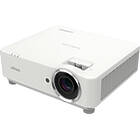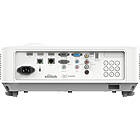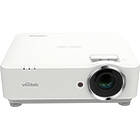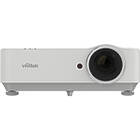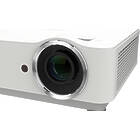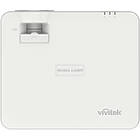Vivitek DU3661Z
Vivitek DU3661Z Key Features
- 5000 ANSI Lumens
- Native Widescreen
- WUXGA 1920*1200 Native Resolution
- 20000 hour lamp life (typical)
- 20000:1 Contrast Ratio
- Native Widescreen
- Lens Shift
- HDBaseT
- Warrantied for 24/7 use
- DICOM Simulation Mode
- Monitor Out
- Network Control
- 7kg (15.4lb.)
- Compact sized, laser projector series weighted only at 7kg, designed for meeting room installation without unnecessary bulk burden. which can be a factor in full and busy rooms where space is at a premium.
- 5,000 lumens of brightness, WUXGA resolution, and 20,000:1 contrast ratio for clear, crisp and bright projection
- Smart features to facilitate meetings and to increase productivity before, during and after its use
- Anti-dust sealed optical engine design and advanced thermal management with optimized cooling and air flow
- Built-in 10W audio speaker to ensure your message is well heard
- Very silent projector at only 29dB in eco mode thanks to its smart fan management, which automatically and dynamically adapts the fan speed according to customized brightness level
- HDBaseT interface ensure robust long signal transmission up to 100 meters
- DICOM Simulation Mode ideal for medical training and seminars
- Click for Vivitek DU3661Z Detailed Specifications
Availability: 3-5 days
Throw Calculator
| Lens | Vertical Offset |
Minimum Throw |
Maximum Throw |
Foot Lamberts |
|---|---|---|---|---|
| Standard Lens | 3cm | 0.81m | 1.21m | 2209 |
Vivitek DU3661Z Throw Chart
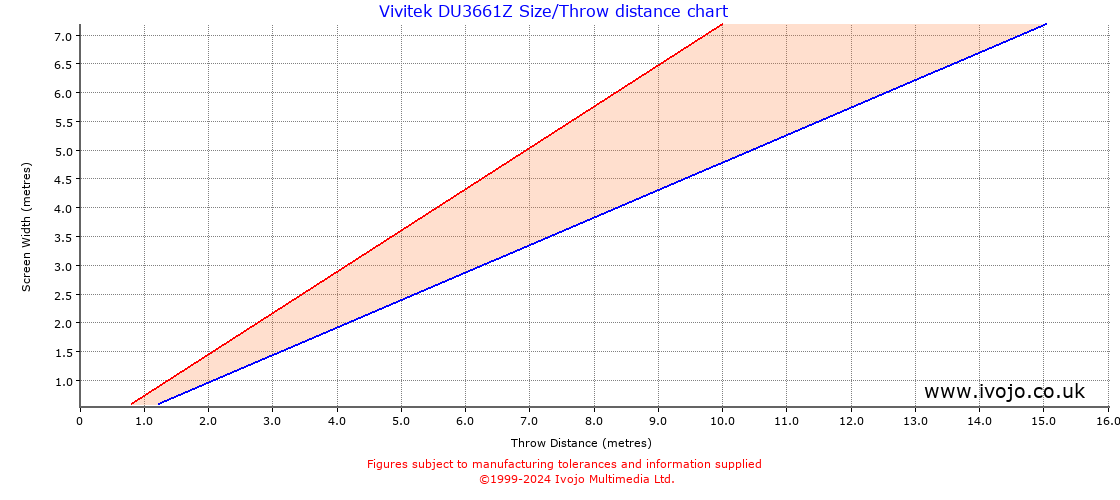
Along the horizontal axis is the distance in metres between the front of the projector and the projection screen. Up the vertical axis is the width of the image the projector will produce. We use width rather than diagonal as the width will remain consistent with the throw distance and zoom setting whereas the height and therefore the diagonal will vary depending on the source. For example, if you have a 4:3 aspect ratio projector and use it to watch a 16:9 aspect ratio DVD then the image will be "letterboxed", i.e. the width will remain the same but the height will be reduced.
Projector Throw From Screen Size Table (16:10 aspect ratio, in metres)
| Diag. | Width | Height | Min. Throw | Max Throw | Area | Nits |
| 0.76 | 0.64 | 0.40 | 0.90 | 1.35 | 0.26² | 6130.9 |
| 1.00 | 0.85 | 0.53 | 1.18 | 1.77 | 0.45² | 3541.2 |
| 1.50 | 1.27 | 0.79 | 1.77 | 2.66 | 1.01² | 1573.9 |
| 2.00 | 1.70 | 1.06 | 2.36 | 3.54 | 1.80² | 885.3 |
| 2.50 | 2.12 | 1.32 | 2.95 | 4.43 | 2.81² | 566.6 |
| 3.00 | 2.54 | 1.59 | 3.54 | 5.32 | 4.04² | 393.5 |
| 3.50 | 2.97 | 1.85 | 4.13 | 6.20 | 5.51² | 289.1 |
| 4.00 | 3.39 | 2.12 | 4.71 | 7.09 | 7.19² | 221.3 |
| 4.50 | 3.82 | 2.38 | 5.30 | 7.98 | 9.10² | 174.9 |
| 5.00 | 4.24 | 2.65 | 5.89 | 8.86 | 11.24² | 141.6 |
Nits are a measure of the brightness of the final image. Multiply the figure in the Nits column by the gain of your screen to obtain a true figure.
Projector lamps dim over their life spans so make allowances by multiplying the foot nits by 0.75 to get a reasonable average.If you intend to calibrate your projector then this will also affect brightness. For home cinema use in a well darkened roon, about 42-70 Nits is ideal. For office use, aim for at least 175.
Screen Size For Given Throw Table
| Throw | Min. Width | Max. Width |
| 1.20 | 0.57 | 0.86 |
| 2.00 | 0.96 | 1.44 |
| 2.50 | 1.20 | 1.80 |
| 3.00 | 1.44 | 2.16 |
| 3.50 | 1.67 | 2.52 |
| 4.00 | 1.91 | 2.88 |
| 4.50 | 2.15 | 3.24 |
| 5.00 | 2.39 | 3.60 |
| 5.50 | 2.63 | 3.96 |
| 6.00 | 2.87 | 4.32 |
| 6.50 | 3.11 | 4.68 |
| 7.00 | 3.35 | 5.04 |
| 7.50 | 3.59 | 5.40 |

